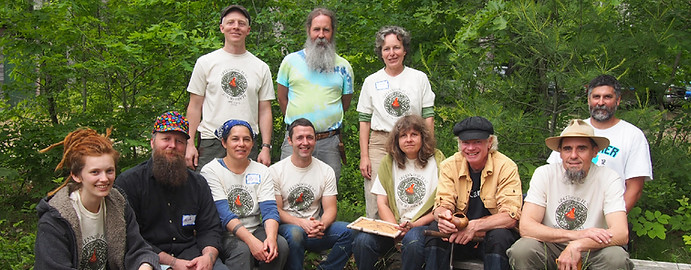Instructors

CRAFT artisans are known for their technical and aesthetic excellence, as well as for a commitment to ensuring that traditional knowledge and skill endure through creative education.



David Fisher
Bowl carver
For the past twenty years, Dave Fisher has explored many aspects of wood carving and green woodworking. A dozen years ago, inspired by traditional Scandinavian forms as well as other cultures, he began concentrating on carving bowls from green logs. Since then, he has carved many bowls in a wide variety of woods and forms, continually learning and refining his methods for designing and carving bowls from green wood with hand tools. Dave has shared his experience through demonstrations, tutorials, and through his website and blog which can be viewed at davidffisher.com and davidffisherblog.wordpress.com, respectively.
JoJo Wood
Spooncarver
A second-generation green woodworker, JoJo Wood has been making almost since she could walk. She spent her early years travelling the world with her father, meeting craftspeople and amassing woodwork skills and knowledge, building the perfect foundation for mastering her chosen crafts. She is now one of the UK’s leading spooncarvers, and is training under the last of the English clogmakers, Jeremy Atkinson. JoJo hopes to inspire more women and younger people to get into woodworking, teaching that technique wins over physical strength every time.
Peter Follansbee
Maker of 17th-century-style English furniture
Peter has been making furniture with hand tools since 1978. His first studies concentrated on traditional chairmaking; he was a regular student at Drew Langsner’s school for woodworking, Country Workshops, in Marshall, N.C. There he learned the fundamentals of ladderback and WIndsor chairmaking, timber framing, cooperage, basketry, spoon and bowl carving, and more. Starting in the late 1980s, Follansbee and his chairmaking teacher John Alexander embarked on a lengthy study of the art of 17th-century style joinery . Working with curators in various museum collections, Alexander and Follansbee rediscovered the craft of the joiner by studying the artifacts, documents, and tool collections combined with experimentation in their workshops. This work eventually culminated in the publication of Make a Joint Stool from a Tree (Lost Art Press, 2012).
From 1994 until 2014, Follansbee held the position of joiner at Plimoth Plantation, a living history museum in Plymouth, Massachusetts. There he made reproduction furniture and other woodwork for use on the museum’s sites. As part of the museum’s Crafts Center, Follansbee’s shop was an exhibit space open to the public. Thus while working, he would continually interact with the museum’s visitors, showing them the tools, methods, and forms applicable to the period.
He has published widely, most frequently in the journal American Furniture, and Popular Woodworking Magazine, where he writes a regular column called Arts and Mysteries. Follansbee is featured in many DVDs, produced by Lie-Nielsen Toolworks of Warren, ME., and is a frequent guest on Roy Underhill’s PBS show The Woodwright’s Shop. He teaches regularly at woodworking schools across the country. Since 2008, has kept the blog Joiner's Notes, found at pfollansbee.wordpress.com/
Paula Marcoux
Food historian, cook, writer
Paula is a food historian who lives in Plymouth, Massachusetts. The author of Cooking with Fire (Storey, 2014), she has worked professionally as an archaeologist, cook, and bread-oven builder. She is the food editor of edible South Shore and South Coast magazine, writes on food history topics for popular and academic audiences, and consults with museums, film producers, and publishers. She teaches about natural leavening, historic baking, and wood-fired cooking in a broad variety of settings. Her work has been featured on The Cooking Channel’s Man Fire Food and on VICELAND's Huang's World. She is the director of Plymouth CRAFT.
Kirsten Schuchert Atchison
Baker
Kirsten has been passionate about food since she started messing up her mother’s kitchen as a teenager. A native of Northern Germany (herring and dense black Vollkornbrot) she moved to Munich to study English Literature and History (pork roast and dumplings), and continued to her master's in Shakespeare Studies at the University of Birmingham (crumpets and lardie cakes).
Upon moving to Plymouth, Massachusetts, in 2000, she cooked her way through the New England cookbook. But the longer she has been in the US, the more important it has become to recreate the food of her homeland, especially the dark rye breads and sourdough whole grain loaves. When she is not cooking or baking, Kirsten works as a translator for TV and as a teacher at the Goethe Institut in Boston.
Tim Manney
Chairmaker and toolmaker
Tim began his spoon-carving career on a stump behind his college dorm. His obsession led him to live and work with Curtis Buchanan in Tennessee, learning to make Windsor chairs. Working with Curtis in his small chair shop gave Tim a life-changing model of how to run a small production workshop; he's been building his life around that model ever since.
When he moved to Maine, Tim started making chairs along with another Windsor chairmaker, Pete Galbert. The two also discovered a niche making hand tools. They collaborated on the design of a reamer and an adze, and Tim has spent the last four years producing those tools to order.
The combination of their chairbuilding experience, prolific prototyping, and endless experimentation has produced a line of tools that are easy to control and intuitive to use.
Tim works out of a small workshop in Maine, producing tools, making Windsor and ladderback chairs, and continuing to obsessively carve spoons. Spoon carving is still the foundation of his woodworking and continues to provide a playground for shape, form, function, and aesthetics.
Elizabeth Creeden
Embroiderer
Elizabeth Creeden is an artist, designer, needlewoman, and educator. For the past forty years, she has worked as a professional embroiderer specializing in historic techniques. Today she is engaged full-time in designing and executing Pilgrim Hall Museum’s Plymouth Tapestry, a contemporary narrative masterwork capitalizing on her fine art training and lifetime of experience. In its production, she closely directs a team of embroiderers, coaching myriad technical and material choices, and inspiring all to exceed expectation.
Creeden was educated at Massachusetts College of Art and Design, and embraced portraiture, freelance illustration, and architectural drafting. She has crafted embroideries for the Clark Institute, the Concord Museum, the Town of Plymouth (including gifts for its sister city, Shichigahama, Japan), the Nichols House Museum, and the White House, as well as many private commissions. She has taught and lectured widely, including at Winterthur Museum and Plymouth CRAFT.
Jarrod Dahl
Birch bark artisan, turner, carver
Jarrod has been working with wood professionally since 1996. He teaches handcraft both nationally and internationally as well as being a maker of fine domestic woodenware. His primary focus is woodturning using a foot-powered lathe and carving spoons with axe and knife. He has a DVD with Popular Woodworking Magazine, The Art of Spoon Carving and is currently writing a book on pole-lathe turning with Lost Art Press.
His studies and research in museum archives in the US, Sweden, and the UK have influenced and inspired him as a craftsperson. He brings extensive knowledge of harvesting natural materials, the use of hand tools, and a deeper philosophical, historical and pragmatic approach to handcrafts to his work and his workshops. Jarrod received the Coperthwaite/Sundqvist Slöjd Fellowship Award in 2016. He lives in Ashland, WI. He sells his work online www.woodspirithandcraft.com
Yin Kong
Chinese cooking instructor
Yin Kong is currently the director of Think!Chinatown, living and working in Manhattan’s Chinatown. In her 5+ years in Beijing, she spent her time eating many dumplings, and she loves sharing the experience of making them as an instructor at Black Sesame Kitchen Cooking School.
Amelia Poole
Dyer
Amelia Poole is an artist raised by scientists who brings her love of fibers and textiles, botany, chemistry, and history to her teaching and textile art. She received an MFA in Woven Textile Design and Construction from the Surrey Institute of Art and Design, Farnham, Surrey, UK.
Her work can be seen in galleries on the Blue Hill Peninsula in Maine. She shows her work at Fine Craft Shows and teaches throughout New England.
Martha Sulya
Potter, needle-felter, pysanky-artist
Martha’s childhood in Downeast Maine exposed her to many different craft and folk artists and a 25 year career in history museums gave her the opportunity to both study original pieces and demonstrate their production. At Plimoth Plantation she worked as a role player, potter, book binder, lecturer; she led child clay workshops and staff training sessions. For 15 years in the Curatorial Department she studied 17th century material culture and production methods, most recently as the Curator of the Historical Reproduction Collection.
Martha has a an MA in Historical Archaeology from UMASS Boston. She has lectured on Historical Archaeology at the Plymouth Public Library and the 1749 Courthouse Museum in Plymouth, MA as well as other venues.
She is passionate about education in multiple learning styles, especially for those who did or do not fit the methodologies of their time. She feels that the company of friends to be the best environment for learning handcrafts, including needle felting and Ukrainian egg decoration, her CRAFT courses.
Kirsten Atchison
Curtis Buchanan
Barn Carder
Elizabeth Creeden
Jarrod Dahl
David Fisher
Peter Follansbee
Pete Galbert
Eleanor Gould
Jessica Hirsch
Barbara Jackson
Justin Keegan
Jay Ketner
Yin Kong
Denise Lebica
Rick McKee
Tim Manney
Paula Marcoux
Jane Mickelborough
Beth Moen
Kathy Neal
George Paré
Amelia Poole
Oliver Pratt
Charlotte Russell
Darrick Sanderson
April Stone
Martha Sulya
Jögge Sundqvist
Laurie Sybertz
Amy Umbel
Roy Underhill
Reid Schwartz
Holly van Sciver
JoJo Wood
Robin Wood
Pret Woodburn













